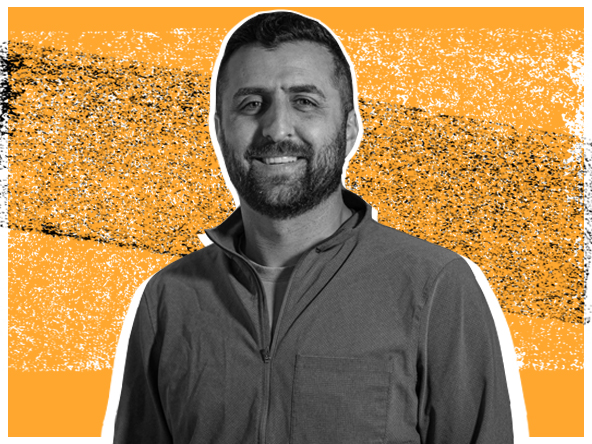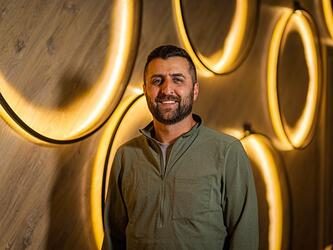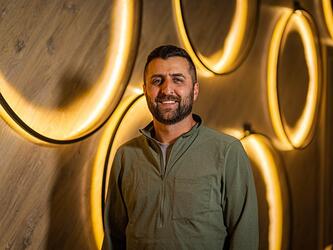How I work: Ryan Barry, president, Zappi

What is your daily routine?
I’m an American president running a business that is global, with 67% of its staff based in the UK. I wake up with a lot of emails and Slack messages, so I have built that into my day – I wake up, give my wife a hug and do a quick check of everything. Then I have two hours, so I exercise every single day, and that helps me stay mentally sharp – I am firmly of the view that if you can get your heart-rate up for 20 minutes a day, you can be much clearer, you can control your mood better and be much more creative. Then I have breakfast with my kids and my wife, and I am on the phone by 8.30am.
The way I structure my day is through a series of discussions around governing the company or key areas of interim focus. From 8.30am to noon, I am typically on a recurring cadence of how are we doing on our innovation strategy, how are we doing on go-to-market, where are some of the scale programmes, and then any one-to-ones I have, typically with our c-suite. I do monthly sessions with the level below our c-suite – our vice-presidents – which gives them an opportunity to meet me without their boss being in the room.
My afternoon is when London is quiet, so I am often doing my own creative work. I have whiteboards all around me. We are owned by a west-coast-based private equity company, so it’s also a time of day where I speak to them. My day moves from topics such as people, customers, technology, creative, finance and artificial intelligence and every day is different – I think context shifting is a big part of the game.
What are the priority issues keeping you busy?
My job is to put people into positions to drive to our annual goals and get closer to our vision. Each quarter, I re-evaluate my own personal priorities – what am I driving, and what am I helping with? There’s usually two to three things I am driving, and then a lot more things I am helping with. I use those goals of a way of working with my executive assistant to determine where I spend my time.
Once a quarter I sit down and review the previous quarter – how did I do? – and I consider what I need to drive this quarter. Who do I need to meet with more? Who do I need to meet with less? Where do I need to be? At this moment, we are driving through economic turbulence, we are at the rise of the biggest technological revolution since e-commerce was born, with AI and what that means for our business, and I am spending a lot of time thinking through the source of our data, sample, and the dire needs for data quality to improve.
Part of the job is I tend to be where the biggest problem is or where the biggest opportunity lies. Some quarters it’s fun and some quarters it means I am dealing with the heat of the most stressful stuff we have got.
I take from your approach to the day that you are quite a goal-orientated person – what benefits do you think that gives you?
Time can control you if you don’t take control of time. By being focused on where I need to take Zappi, it allows me to be more thoughtful about where I spend my minutes and, probably more importantly, where I don’t. If I am in control of my time, I can make sure I execute the things the company needs me to do. I can be agile as a leader to make sure Zappi is doing the things it needs to do to keep up with the market and keep our customers successful.
What motivates you in your career?
The concept of modern work. It is the thesis that businesses that are customer-centric and employee-centric win, and businesses that aren’t, lose. What I mean is empowering people closest to the problem to have the skills, tools, context and autonomy to make decisions. For me, getting to run a business that is helping a company be more customer-centric, where people are happy to work, is what gets me out of bed every day.
In terms of my personal goals, I am a learner – I want to be intellectually stimulated and challenged. I find I get that through my work because of the context shifting – I can go from the future of insights to talking about natural language processing to discussing financial modelling. Learning is a key part of career progression – you will find that if you focus on learning, the money, the title, or whatever your goals are, follow.
What motivates you outside work?
My family. I have three kids and my wife, whom I would be nothing without. I have an outgoing, extroverted, travel-the-world kind of job, but you can find me on the weekends reading a book and playing with my kids. I want to put my family in a good position and live life.
How do you achieve a work-life balance?
It is hard. You have to find ways to compartmentalise. I work at home, which makes it difficult. I am sitting inside my office, and the average day, at 5.30pm, I go from the president of Zappi to ‘Dad, we need a grilled cheese’. Before the pandemic, you had the benefit of an hour commute to listen to a podcast or music and decompress. Now I go out the front door and go for a walk for five minutes.
Some days you do better at that harmonisation than others. Some of it is making sure you don’t have access to the cloud – once you start thinking, you can’t unthink. Meditation really helps me – I meditate usually once or twice a day. Finding ways to ebb and flow helps me.
Do you prefer the advantages of home working, or do you miss the office environment?
On balance, I prefer my current set-up, but there are significant pros and cons. For me, selfishly, not taking three hours a day to commute to Boston, missing two meals, to undoubtedly sit on Zoom because I have a global role, is amazing. The down side of that is we have a distributed workforce, and we have four to five hours a day where Zappi is awake at the same time. When you are distributed and remote, you lack the ‘you got a minute?’. That’s what I miss most about office culture – someone can come up to me and say they need to pick my brain. I long for that, so we try to find ways to replicate that.
We do all-company away days every other year. We encourage our employees to get together for the right reasons – we have a hard problem, let’s get the right people in the room. We also spend a good bit of money on entertainment to help our staff get together and connect as human beings. The benefit of being remote is we get to hire people all over the world. It opens up a talent pool.
What is your working style?
Hybrid. I really value live time for thoughtful, facilitated discussion and debate. I also really value time to think. I protect those times. I have leaned into the notion of asynchronous work. I don’t want to be in a call and be presented to – I would rather get a three-minute video with the deck, have a night to think about it and then have a discussion about two points rather than investing an hour of my time to have someone talk at me.
If I am trying to make a decision, I will write an essay on what the problem is and what I am trying to do. That helps explain my logic, and it is something we have brought in across the company as ‘request for comment’. If someone is trying to make a decision, they explain their logic in written form, invite comments from people impacted, and then decision-makers are expected to take that advice and listen to it and iterate their decision making. If you do these things right, then you have time to think and be creative and think beyond the day to day. Employees today are burdened with noise everywhere – you can just show up and be busy all day and not actually achieve anything.
This interview has been edited for clarity.

We hope you enjoyed this article.
Research Live is published by MRS.
The Market Research Society (MRS) exists to promote and protect the research sector, showcasing how research delivers impact for businesses and government.
Members of MRS enjoy many benefits including tailoured policy guidance, discounts on training and conferences, and access to member-only content.
For example, there's an archive of winning case studies from over a decade of MRS Awards.
Find out more about the benefits of joining MRS here.














0 Comments